
Gorillas & East Africa Safari Itinerary
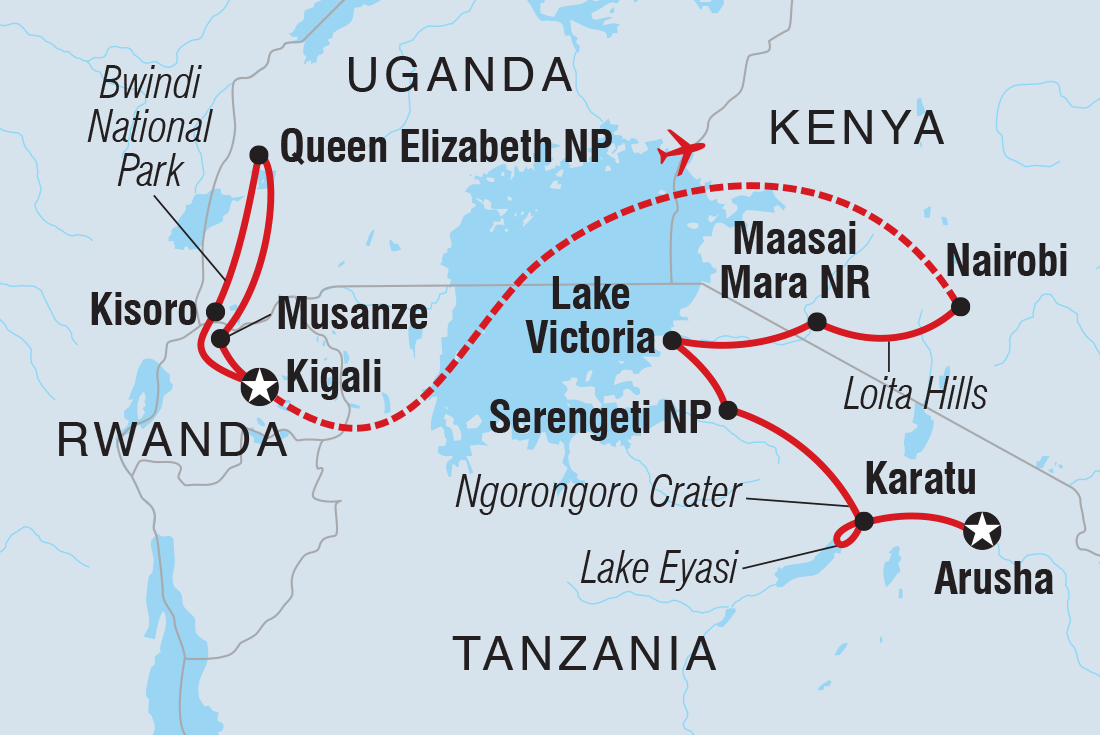


Welcome to Kigali, the capital of Rwanda since it gained independence in 1962. Most associate Rwanda with the horrific genocide that took place in 1994, but this is a country that has been striving to rebuild its economy for years and offers so much to the intrepid traveller. And though the past won't, and shouldn't, be forgotten, the future of Rwanda's tourism is looking bright thanks to its welcoming people, an abundance of lakes and the beautiful Virunga Mountains. Your adventure begins by meeting your fellow travellers and local leader at 6pm.
After breakfast this morning, your tour leader will take you to the Kigali Genocide Memorial Centre, which opened in 2004 to mark the 10th commemoration of the genocide against the Tutsi people. It serves as a museum detailing the history and consequences of Rwanda's genocide and a place for people to grieve for lost friends and family. This afternoon, you’ll drive to Musanze – the gateway to Volcanoes National Park, home to gorillas and golden monkeys.
This afternoon, you'll visit The Gorilla Doctors headquaters; the only organisation in the world dedicated to saving the mountain and eastern lowland (Grauer’s) gorilla species one gorilla patient at a time using veterinary medicine and science. They monitor the health of gorilla groups to ensure the early detection of disease and injury, and stage medical interventions when gorillas suffer from human-induced or life-threatening trauma or disease.
Today, you’ll visit the The Ellen DeGeneres Campus of the Dian Fossey Gorilla Fund. This research centre leads the world in protecting and studying gorillas while helping communities build their conservation capabilities. Learn about Dian Fossey’s life and the conservation of endangered mountain gorillas in Rwanda.
There are heaps of optional activities to do in Musanze, including Golden Monkey Trekking in the Virunga Mountains, the Mount Bisoke trek, or keep it chill with a canoe ride on the Mukungwa River. Maybe visit Redrocks Rwanda, where you’ll learn about the local banana beer production and be treated to some dancing, drumming and basket-weaving demonstrations.
Today, you’ll leave Rwanda as we cross the border into Uganda, making our way to Queen Elizabeth National Park. This park is home to 618 bird species, 10 species of primates - including chimpanzees, and 95 different types of mammals. The route to your accommodation may feel like an unofficial safari. Keep a look out for African elephants, buffalo, hippos, warthogs, Nile crocodiles, leopards, spotted hyenas, lions and chimpanzees. Tonight, stay in a simple safari lodge within the park overlooking the Kazinga Channel.
Wake up for another exciting day in Queen Elizabeth National Park with another 4x4 Game Drive. Be on the lookout for any sightings you may have missed yesterday, and if you’re really lucky, you might be able to spot leopards or lions.
This afternoon, you have the opportunity to see the park from a different perspective with an optional cruise down the Kazinga Channel, linking Lake Edward to Lake George. You’ll be joined by local guides who will fill you in on everything you could want to know about the landscape and the animals who live within it – be on the lookout for hippos basking on the shore, as well as crocodiles, herds of elephants and abundant birdlife.
This morning we make our way to Ishasha, the southern sector of Queen Elizabeth National Park. Here you meet some local residents to learn more about rural life in Uganda. Visit a local organic farm, medicine garden and homestead and learn how its owner is tackling human-wildlife conflict with his anti-crop raiding techniques. You’ll also meet a local Mukiga woman who will share her story while showing you how to sort, pound and grind millet to make porridge and other Bakiga meals.
This part of the park is famous for its tree climbing lions, so be on the look out as you make the game drive towards our ecolodge in the northern sector of the park frequented by herds of elephants, buffaloes and antelopes!
Today, drive out of the Queen Elizabeth National Park on your way to the southwest tip of Uganda (approximately 6 hours). The journey is like a game drive in itself, with the chance to spot zebras, antelopes, baboons and monkeys out the window. When you arrive at the corner of Uganda, where the border touches Rwanda and the Democratic Republic of Congo, you’ll be based in Kisoro, which provides access to seven different gorilla groups located in Mgahinga, Nkuringo, Rushaga and Nshongi.
Join a local guide and trackers as you climb through the rugged, mountainous terrain of Bwindi National Park in search of mountain gorillas. A quick lock of eyes with these creatures is a truly primal moment and visits are strictly controlled to minimise disturbance. Make no mistake, tracking gorillas is no walk in the park – it's called Bwinidi Impenetrable National Park for a reason. It can be wet, muddy, strenuous and uncomfortable, but the indescribable elation at coming across a group of gorillas is worth the effort. Spend a mesmerising hour with the gorillas as they eat, sleep, groom and play as the male silverback watches over them, then return to the lodge for dinner and to reflect on this incredible experience.
After breakfast this morning, make the journey back to Kigali. You'll be dropped off at Kigali Airport for your short flight to Nairobi this evening.
When you arrive at Nairobi Airport, you'll be met by a local representative and transferred to your hotel. Check in, freshen up and get a good night's rest before meeting your group in the morning.
Transfer from Nairobi to the famous Maasai Mara – one of the best game reserves in Africa. On the way, you'll stop in Loita Hills – a remote region home to the traditional Maasai people. This is one of the key places where the Maasai people still practice their traditional way of life, with little influence from the Western world. Visit the Tepesua Village, known for championing Maasai women’s health and education. Maasai Warriors will welcome you here by way of traditional song and dance. Meet your hosts and attend a talk full of insights into this remarkable and ancient culture. Take a walk to the community village, which was founded for widows who can never remarry and lost their cows due to drought. The village offers support, safety and economic growth through the Tepesua Widows Income Project. Here, the women make handicrafts and sew handbags using sustainable materials as well as washable sanitary pads and backpacks to sell to visitors and locals. Learn about village life and be shown around a traditional Maasai home and its cattle enclosures. Continue to the outskirts of the Maasai Mara, where your permanent tented camp can be found.
This morning, you have the option to take part in a hot air balloon ride and bush breakfast, giving you a rare chance to see the open plains at sunrise, teeming with wildlife. After, explore the Maasai Mara in 4WD safari vehicles with game drives in the morning and the afternoon today to give you the best chance to spot the Big Five. This is the quintessential African experience, and with sparse open plains and some of the world's most impressive animals, you won't soon forget this one. Keep your eyes peeled for wildebeest, lions, leopards, antelope and giraffes along the way.
Get ready for a long travel day as you journey toward the Kenya-Tanzania border and make your way to the magnificent Lake Victoria. This vast lake is the main source of the Nile, the longest river in the world, and spans the shores of Kenya, Tanzania, and Uganda. On arrival, unwind with a lakeside dinner while you ponder the magnitude of the world’s largest tropical lake.
Enjoy a relaxed morning, taking in the magnificent views of Lake Victoria in the morning light. Travel to Serengeti National Park, renowned for its incredible wildlife and vast, open landscapes. After passing through the park gate, experience the greatest commute possible as we slowly make our way to our permanent tented camp via the 'scenic safari route.' Along the way, stop to take photos of the abundant wildlife and stunning views. Tonight, you'll have a true African safari experience – with your comfortable safari camp set right in the heart of the Serengeti. After dinner, gather around the campfire to share stories, then fall asleep to the sounds of the wild.
Wake to another glorious day in the Serengeti National Park. Start the day with an early morning 4WD safari to spot the wildlife when they're at their most active. Then, return to camp for a relaxed brunch. This afternoon, head off again for another drive through the park. Return to camp for dinner and another night under the Serengeti's stars.
Enjoy a final game drive through the Serengeti National Park this morning as you exit your camp inside the park and make your way to the park gate. From here, drive to the Ngorongoro Conservation area, where you'll hop in the park's 4WD jeeps and descend to the crater floor. The jeeps have an open roof, and the animals here are less wary of humans and vehicles, which makes watching them up close easier. Take in the spectacular views from the crater's rim as you make your way to the bottom, where animals roam the lakes, rivers, woodlands and hills. Keep an eye out for wildebeest, lion, zebra, cheetah, buffalo, gazelle, endangered black rhino and the colourfully dressed Maasai people who often water their cattle at the lake here. This afternoon, leave the Ngorongoro Crater and drive to Karatu – a small town on its outskirts and your base for the next two nights.
After breakfast, make your way towards Lake Eyasi, a vast seasonal soda lake, stopping at a scenic viewpoint to take in the magnificent views across its shimmering waters. The area surrounding Lake Eyasi has been home to the Hadzabe people for more than 10,000 years and is one of the few places in Africa where traditional tribal life continues with little modern influence. Today’s visit to the Hadzabe lands offers fascinating insight into this ancient culture and a chance to learn about their way of life. Meet community members and take part in daily activities such as hunting, gathering, and traditional dance, while learning about their unique ‘click’ language — believed to be one of the oldest still spoken today. Return to your lodge in Karatu later in the day to relax and unwind.
Today is a free day to relax or choose from the various optional activities available from your base in Karatu. You might like to head to a local coffee plantation or take a game drive in Lake Manyara National Park. Maybe opt for a hike through the Ngorongoro Reserve Forest to Elephant Caves accompanied by an expert local guide and armed ranger. This is the perfect way to stretch your legs after a few days of travel. You'll hike through the Ngorongoro rainforest as your local guide explains the ins and outs of the area and points out interesting animal tracks and footprints. Marvel at the wild landscape and spot the varied birdlife as you walk. In the afternoon, you’ll head to Arusha, where you spend your last night.
Your adventure comes to an end after breakfast today. A departure transfer to either Kilimanjaro Airport (JRO) or Arusha Airport (ARK) can be booked at an additional expense. Alternatively, you can continue with your crew to finish in Nairobi.

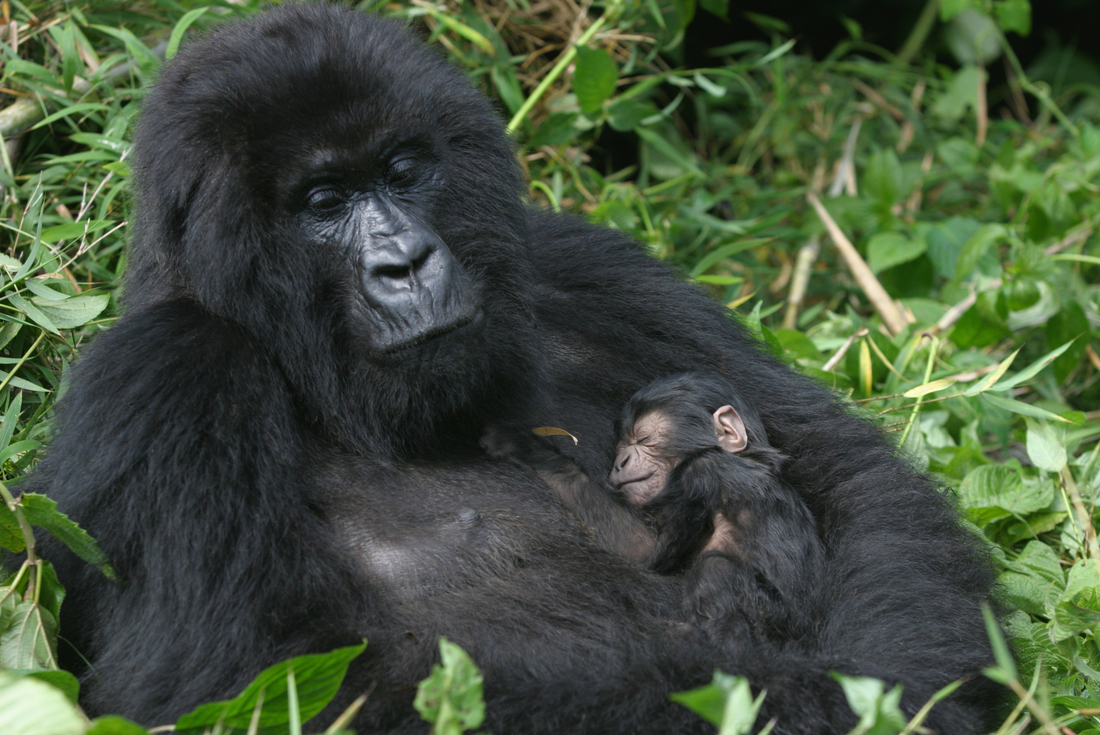
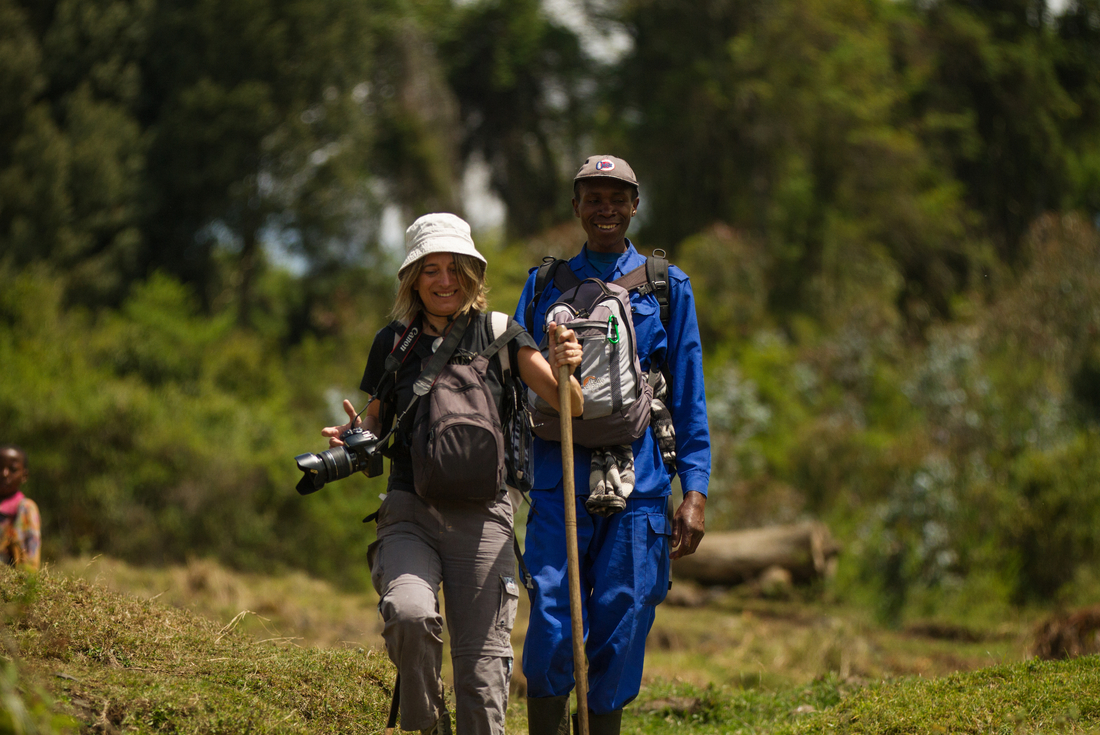
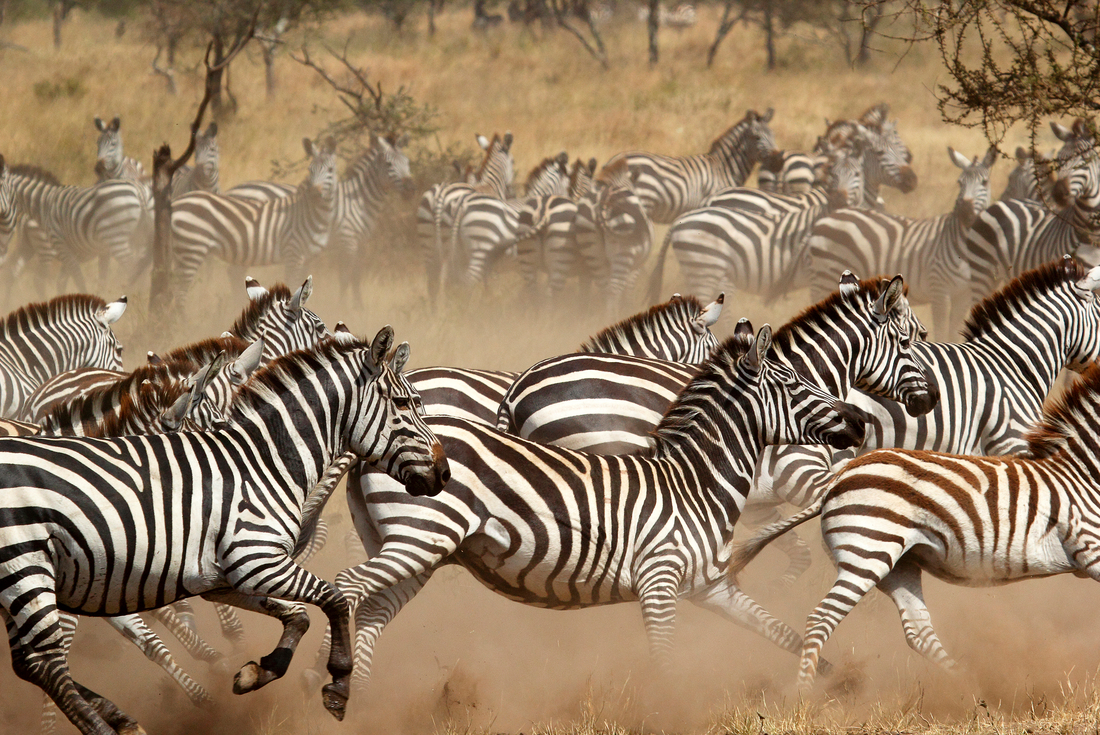
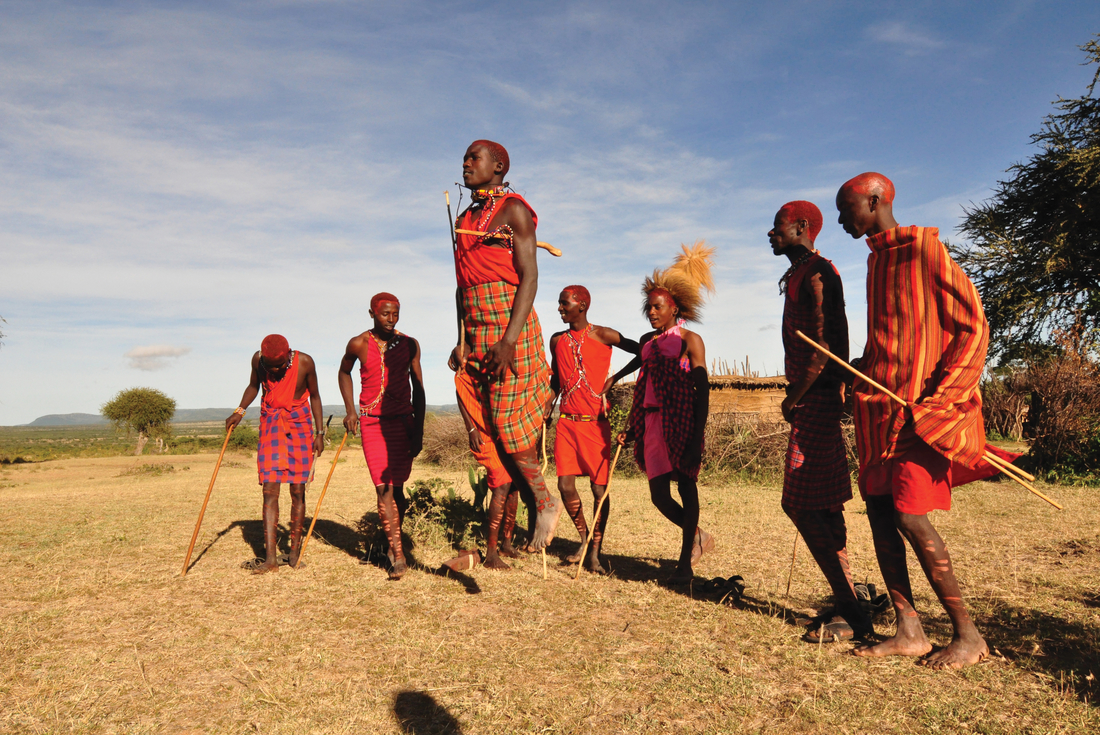
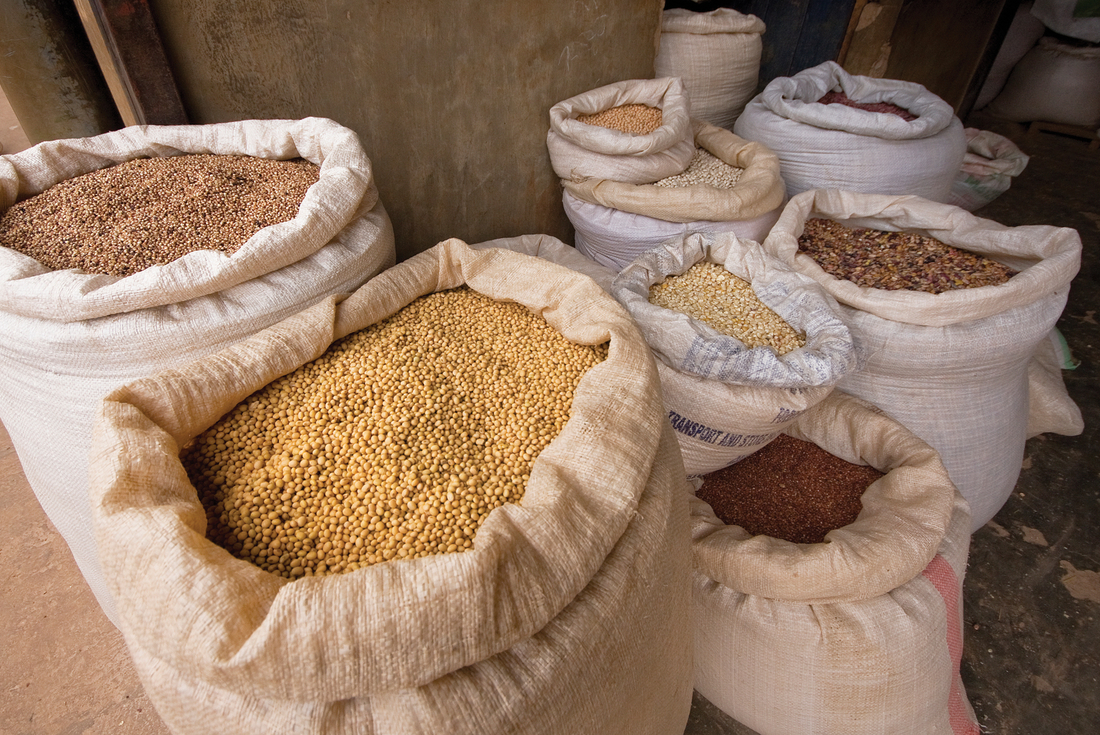
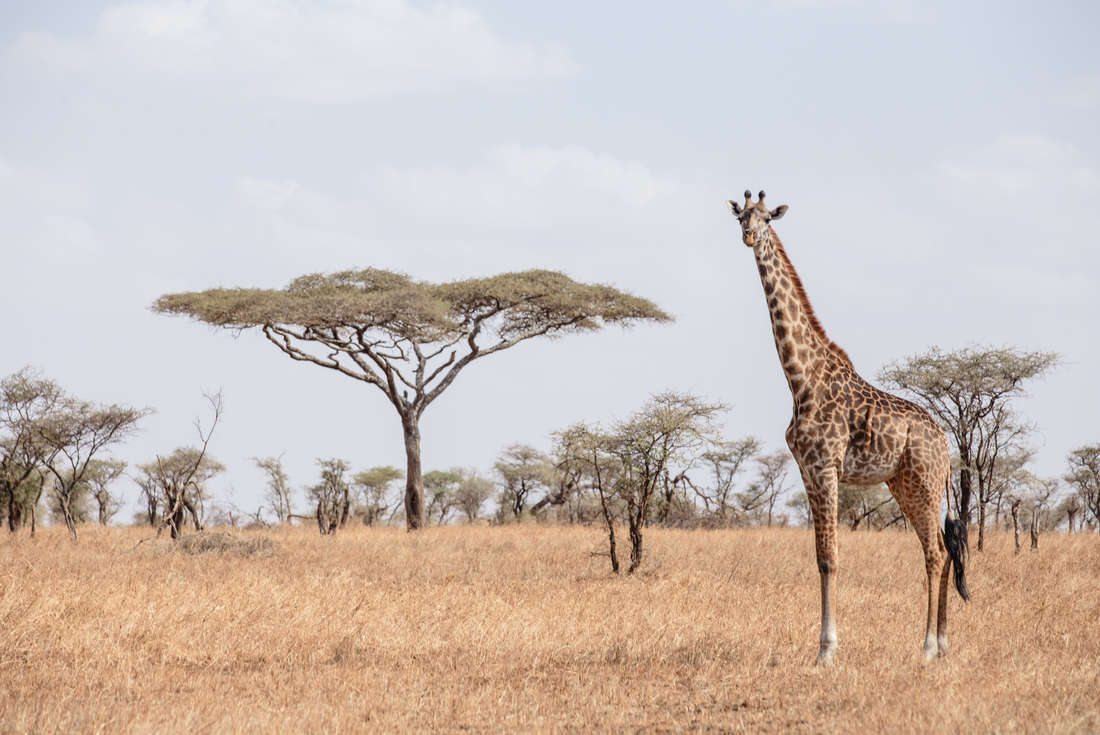
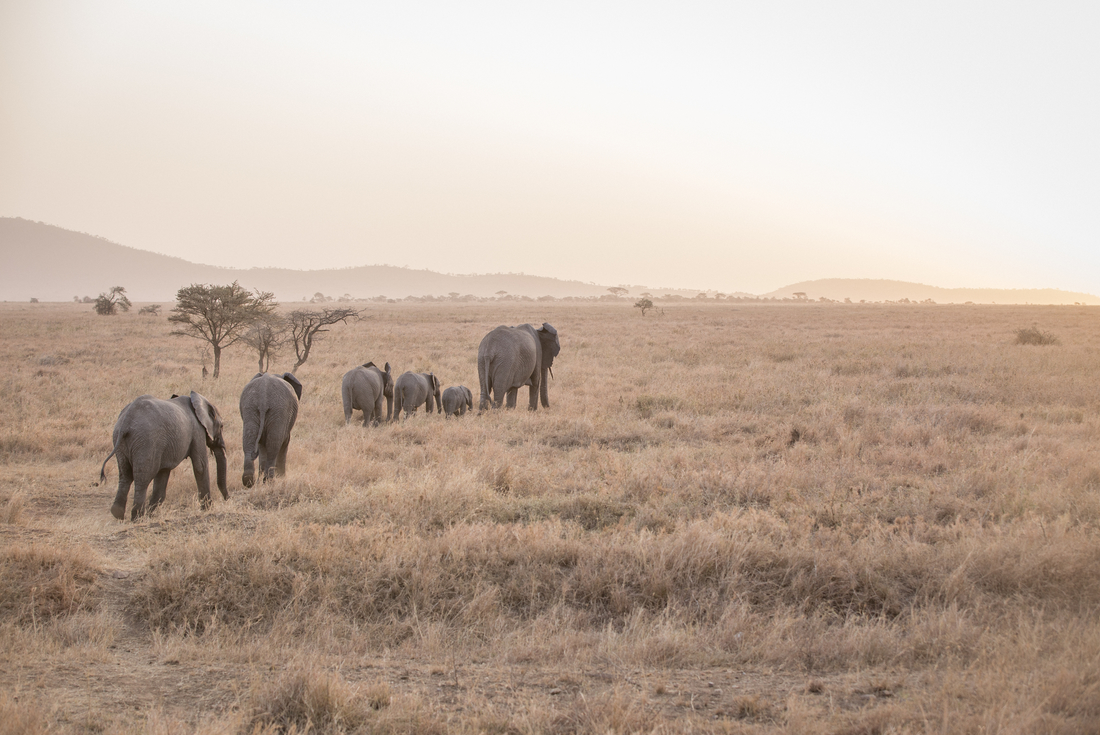
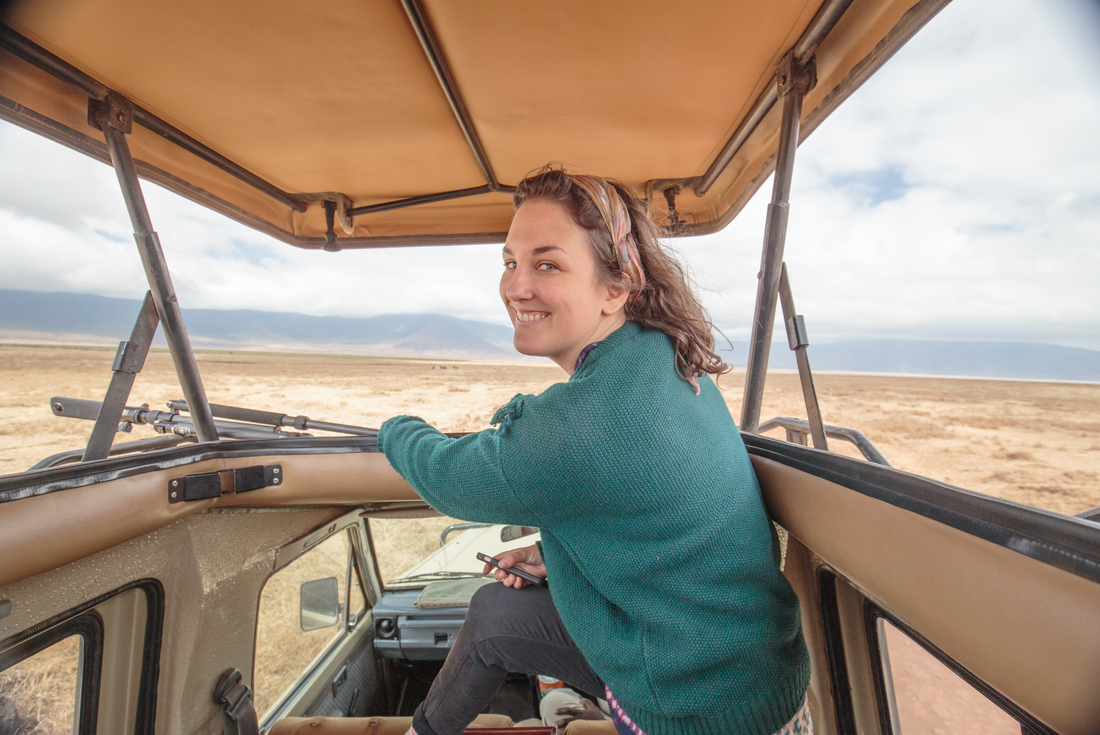
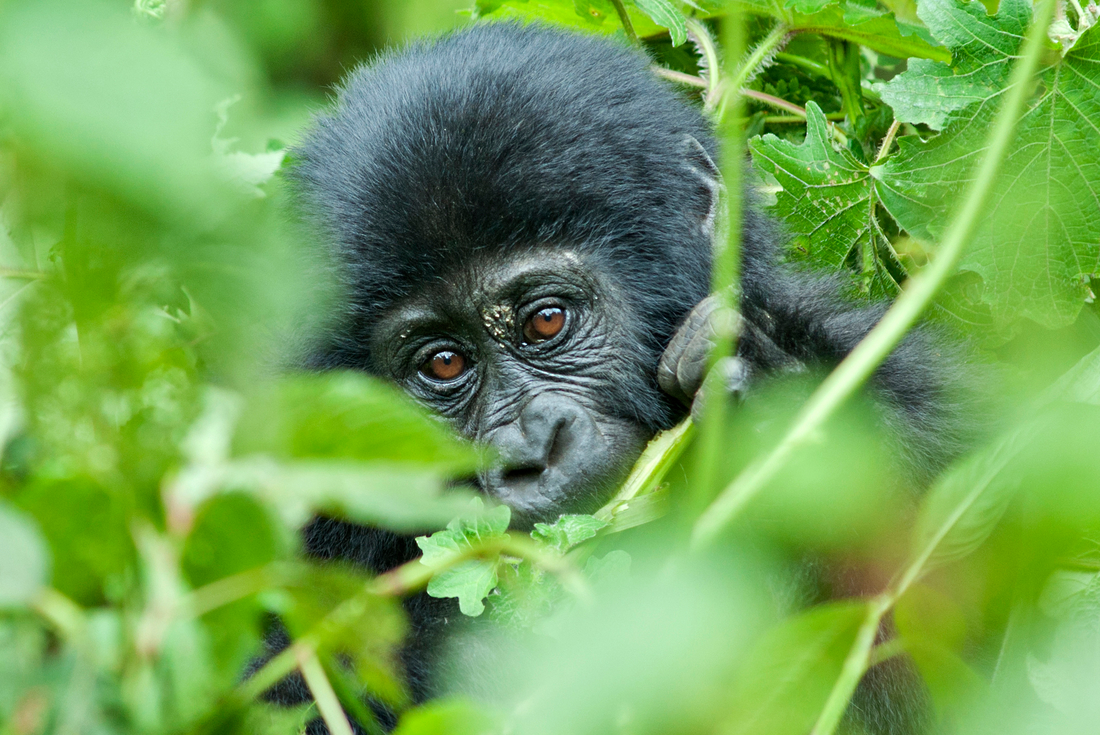
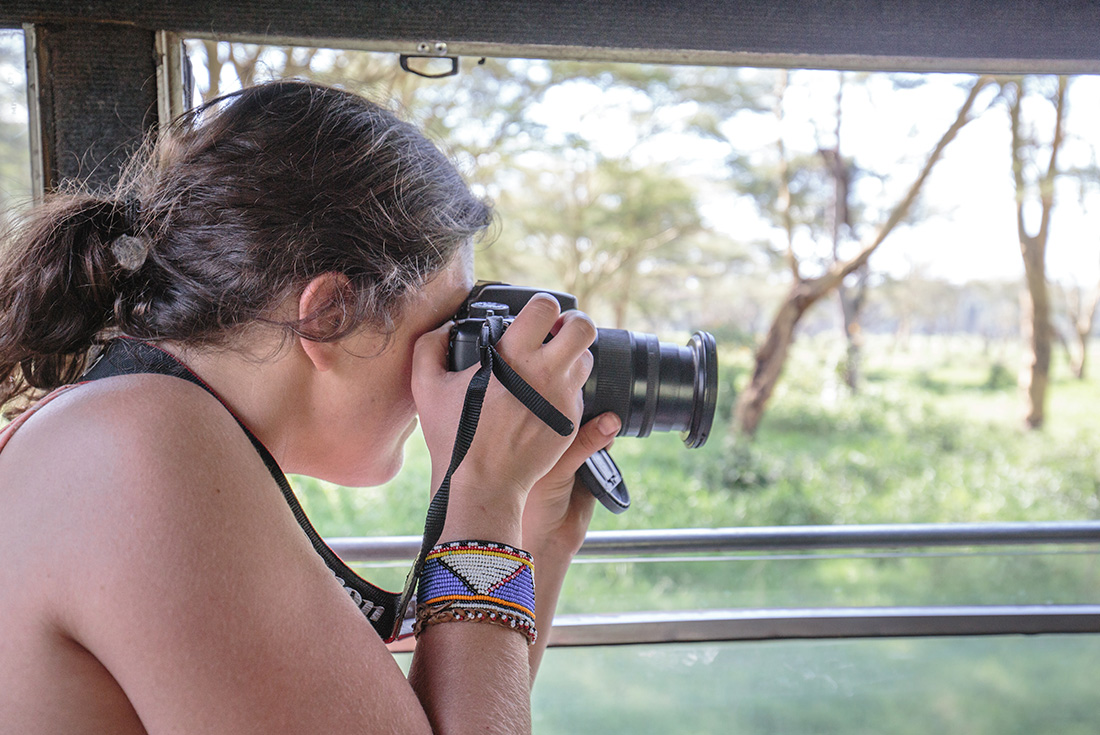
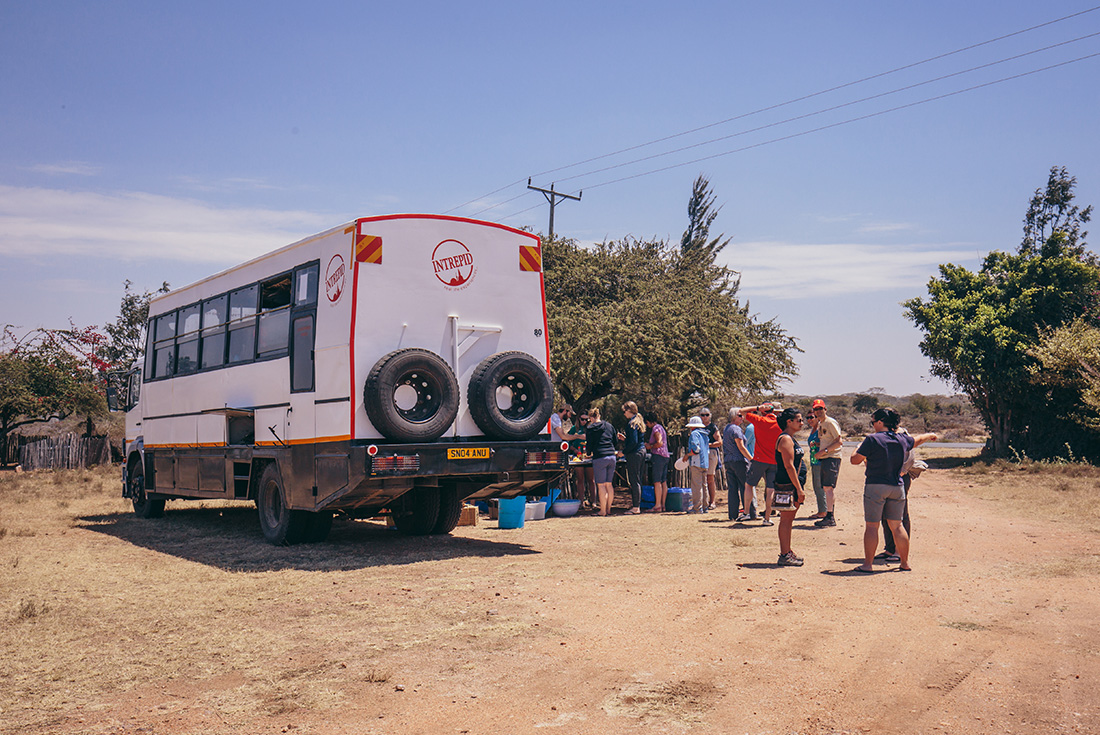
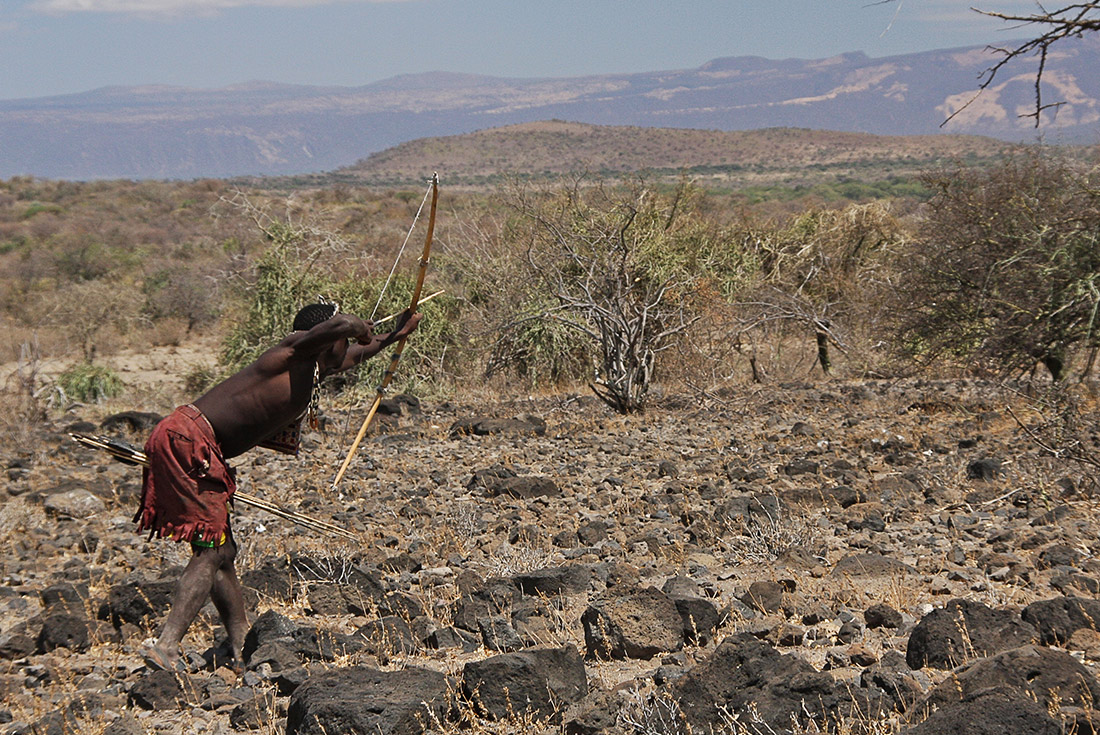
Kigali - Genocide Memorial Centre
Musanze - Visit to The Gorilla Doctors HQ
Queen Elizabeth National Park - 4x4 Game Drive
Ishasha - Community Tourism Project Visit
Queen Elizabeth National Park - 4x4 Game Drive
Bwindi National Park - Mountain Gorilla Permit & Trek
Loita Hills - Maasai Village Visit
Maasai Mara National Reserve - Full Day 4WD Safari
Serengeti National Park - 4WD Safari
Serengeti National Park - Afternoon 4WD Safari
Serengeti National Park - Morning 4WD Safari
Ngorongoro Crater - 4x4 Game Drive
Serengeti National Park - Morning 4WD Safari
Lake Eyasi - Hadzabe Bushmen Visit
Lake Eyasi - Soda Lake View Point
Seek out the rare mountain gorilla on a trek through Uganda's steamy forests and spend an unforgettable hour in their presence, with permits included in the price of the trip.
Explore the Serengeti National Park in depth with three 4WD safaris and two nights sleeping in a safari camp in the middle of this spectacular wildlife arena.
Learn about Rwanda's devastating history at the Kigali Genocide Memorial Centre, and see what life looks like today with a tour of the city’s most vibrant neighbourhoods.
Meet members of the Ishasha community for a look at rural life in Uganda, visiting an organic farm and medicine garden and learn how human-wildlife conflict is being tackled with anti-crop raiding techniques
Get to know the diverse wildlife of Queen Elizabeth National Park on a series of 4WD safaris and an optional boat cruise around the lake.
Take a mind-blowing safari across the floor of the Ngorongoro Crater in an open roof 4WD for a chance to see the endangered black rhinoceros, plus lions, zebra and more.
The Nest, 7 KG 6 Avenue, , Kigali, RWANDA, Phone: +250 790 008 935
Njiro Legacy, Njiro Rd, Engutoto, , Arusha, TANZANIA, UNITED REPUBLIC OF
1. A single supplement is available if you’d prefer not to share a room on this trip. The single supplement applies to all nights of your trip and is subject to availability. Please speak to your booking agent for further information.
2. This trip requires a higher non-refundable deposit (AUD1000, USD1000, EUR800, NZD1250, GBP650, CAD1000, ZAR8000, CHF900) in order to secure the included gorilla permit. Please note that we need to confirm availability of a gorilla permit if you are booking within 45 days of departure. The additional deposit paid at the time of booking will be credited to the final balance of your booking.
3. This itinerary offers two optional sunrise balloon safaris - one in the Maasai Mara and another in Serengeti National Park. We offer both as a pre-booked service, which will guarantee you a place. If you would rather wait and try to get a better price by booking this locally on the ground, you are welcome to – but keep in mind that this is a popular activity, and places are limited.
4. Some governments have increased foreign travel advice around security in place for Queen Elizabeth National Park in Uganda. Please check your government’s foreign travel advice before departure and ensure your travel insurance covers all destinations and activities on your itinerary.
While we always endeavour to provide the best possible holiday experience, due to the nature of travel and the areas we visit sometimes things can and do go wrong. Should any issue occur while you are on your trip, it is imperative that you discuss this with your group leader or local representative straight away so that they can do their best to rectify the problem and save any potential negative impact on the rest of your trip.
We recognise that there may be times when your group leader or local representative may not be able to resolve a situation to your satisfaction - if this is the case, please ask the group leader or local representative to speak to their direct manager.
You may also choose to provide details in your online feedback, which we ask you to complete within 30 days of the end of your trip. Please do be aware that it is very difficult for us to provide any practical help after the trip is completed, so informing us while still travelling will give us the opportunity to resolve the issue in real-time., For transfers and accommodation issues, Intrepid's Kenya Office can be reached on their 24-hour number +254 758 555 556 or +254 758 555 557. , For any concerns regarding pre-booked transfers, you can reach out to the transfer company via WhatsApp at +250 787 665 114., For general contact details please use the following page: https://www.intrepidtravel.com/contact-us, In case of a genuine crisis or emergency, you can reach our local office on the numbers below:
, Intrepid's Local Operator: +254 758 555 550/1.
No two journeys in Africa are identical. Be prepared for travel times to be longer or shorter than advised. Weather and road conditions can change things significantly, so embrace the detours, shortcuts, and unforgettable moments along the way., The sheer thrill in coming across a habituated group of gorillas, dominated by a great male silverback, is unbeatable. But please keep in mind that tracking gorillas in the dense forest can sometimes be wet, muddy and uncomfortable. The terrain is by no means easy either, so it can be pretty strenuous and often humid. You need to be prepared and fit enough to walk up to 4 hours up and down hills., Staying in a permanent tented camp in the Serengeti National Park, with no barriers between you and the animals, is amazing, but it's important to heed the safety advice of your leader., This is a 4WD overland trip. That means you’ll be travelling with a group in 4WD vehicles, visiting remote communities and world-renowned wildlife parks. The drive days can be long, but it’s as much about the journey as the destination, and half the fun is the camaraderie., There will be many early starts, either to make use of the better safari time or to beat the morning traffic on long travel days., The day-to-day itinerary features a selection of optional activities. Please note that this list is not exhaustive and is intended only as a guide. Prices are approximate and may change at the discretion of the local provider, and all activities are subject to availability.
Seek out the rare mountain gorilla on a trek through Uganda's steamy forests and spend an unforgettable hour in their presence, with permits included in the price of the trip., Explore the Serengeti National Park in depth with three 4WD safaris and two nights sleeping in a safari camp in the middle of this spectacular wildlife arena., Learn about Rwanda's devastating history at the Kigali Genocide Memorial Centre, and see what life looks like today with a tour of the city’s most vibrant neighbourhoods., Meet members of the Ishasha community for a look at rural life in Uganda, visiting an organic farm and medicine garden and learn how human-wildlife conflict is being tackled with anti-crop raiding techniques, Get to know the diverse wildlife of Queen Elizabeth National Park on a series of 4WD safaris and an optional boat cruise around the lake., Take a mind-blowing safari across the floor of the Ngorongoro Crater in an open roof 4WD for a chance to see the endangered black rhinoceros, plus lions, zebra and more.
On the Rwanda & Uganda portion of this trip you will have an East African Intrepid Leader and up to 2 drivers from Rwanda.
On the Kenya & Tanzania portion of this trip you will be accompanied by three crew members - Group Leader, Cook and Driver who will usually be Kenyan.
Your Group Leader’s role involves organizing the overall operation and smooth-running of the trip, managing trip logistics, coordinating the tipping kitty (where applicable) and will form work groups to take turns cooking, cleaning and shopping. (From time to time your leader may drive as well)
Your Group Leader will work towards making the trip as safe and enjoyable as possible for all travellers. Intrepid trips are built around the co–operation and participation of all the group members under the supervision of the group leader. The group leader will show the group how to set up and use the equipment.
While not being guides in the traditional sense you can expect them to have a broad general knowledge of the countries visited on the trip, including historical, cultural, religious and social aspects. We also use local guides where we think more specific knowledge will add to the enjoyment of the places we are visiting, especially when tracking and identifying game - we think it's the best of both worlds. Regardless of the country of origin, our Group Leaders are chosen for their leadership skills and are wonderful ambassadors for our company and our beautiful continent and its people.
Your Cook is responsible for the cooking and will help to coordinate the work groups for preparing the meals and washing up! Cooks are also responsible for organizing food shopping (they are always happy to have you on board) and most importantly, they make sure high hygiene standards are kept at all times while camping.
Your Driver’s main responsibility is to get you to your destination safely; they are also responsible for the maintenance of the vehicles along the way.
Everyone is expected participate and carry their share of the workload/duties, making camp chores easier. The duties Rota system is adopted where all members share in general camp duties – cooking, shopping, washing up etc.
If the whole group participates it will be quicker, easier, and more fun.
We endeavour to provide the services of an experienced leader and crew; however, situations may arise where your leader is new to a particular region or training other group leaders.
FREE TIME & OPTIONAL ACTIVITIES
Your group leader or local representative will accompany you on all included activities; however, during your trip, you'll have some free time to pursue your own interests, relax and take it easy or explore at your leisure. While your group leader or local representative will assist you with the available options in a given location, please note that any optional activities you undertake are not part of your Intrepid itinerary, and Intrepid makes no representations about the safety of the activity or the standard of the operators running them. Please use your own good judgment when selecting an activity in your free time. Please also note that your group leader or local representative has the authority to amend or cancel any part of the trip itinerary if it's deemed necessary due to safety concerns.
INTREPID SAFETY STANDARDS
For more details on the type of conditions and safety standards you can expect on your trip, please refer to Intrepid's operational safety policy on our website. We recommend that you take a moment to read through this information before travelling, and would appreciate any feedback on how well it's being implemented in the field:
www.intrepidtravel.com/safety-guidelines
, FOREIGN TRAVEL ADVICE FOR QUEEN ELIZABETH NATIONAL PARK
Some governments have increased foreign travel advice around security in place for Queen Elizabeth National Park in Uganda. In particular, the UK government has heightened travel advice in response to a recent targeted attack on UK travellers in Queen Elizabeth National Park. Insurance coverage (particularly for UK travellers) may be affected by this level of advice. Travel insurance that covers all destinations and activities within your itinerary is compulsory to join this trip. Please check your government’s foreign travel advice before departure and contact your insurance provider to ensure you have the appropriate level of coverage for travel to Queen Elizabeth National Park.
, LGBTQIA+ TRAVELLERS IN TANZANIA & UGANDA
Same-sex relationships are illegal in Uganda and Tanzania (including Zanzibar), and convictions under these laws may result in severe sentences. Same-sex public displays of affection, like holding hands or kissing in public, could lead to arrest and imprisonment. LGBTQIA+ travellers should carefully consider the risks, and refer to your government's official travel advisories for the most up-to-date advice before you travel.
, UNFENCED CAMPSITES
On some trips you will at times stay in unfenced campsites within National Parks. While this is a fantastic experience, there are a few safety rules to follow. While staying in National Parks it's important that you listen to any advice given by your group leader or local representative and the park rangers regarding responsible and safe behaviour., BILHARZIA
Bilharzia is a parasitical disease which is usually spread by swimming in contaminated water. It can be assumed that the infection is present, to a greater or lesser extent, in almost all water sources, but most especially in shallow reedy waters in the vicinity of villages.
Although the adult parasites do not themselves cause a great deal of harm, after about 4-6 weeks they start to lay eggs, which triggers an intense but usually ineffective immune response, the symptoms of which can include fever, cough, abdominal pain, and an itchy skin complaint known as safari itch. After a while the symptoms settle down and the patient is left with a sense of feeling tired all the time.
PASSPORT
You’ll need a valid passport to travel internationally and most countries require your passport to have a minimum of 6 months validity, so remember to check the expiry date.
We need your passport information to get everything ready for your trip so it’s important that the information on your booking matches your passport exactly. Please take care to provide the correct details. We recommend carrying a copy of the photo page of your passport while travelling and leaving a copy at home with family or friends.
VISAS & ENTRY REQUIREMENTS
Many countries require a visa and obtaining the correct visa for your trip and any countries you may transit through is your responsibility. We recommend you check your visa requirements as soon as you have booked your trip. This will ensure you have time to prepare your documents and for your visa application to be processed. You can check the entry requirements for your nationality on your government's foreign travel advisories, consular websites or on our page here: www.intrepidtravel.com/visa-entry-requirements, LETTER OF INVITAION
KENYA / TANZANIA / UGANDA / RWANDA
Should you require a letter of invitation or a list of hotel confirmations, please contact your booking agent, and we will issue one tailored to your specific tour and departure.
INFORMATION FOR VISA APPLICATIONS:
If you require an address for Visa Applications in Tanzania, please use:
Kibo Palace Hotel
PO Box 2523
Old Moshi Road
Arusha - Tanzania
Phone: +255 272544472
If you require a contact number for Visa Applications in Tanzania, please use:
Intrepid Tanzania: +255 758 509 579 / +255 787 906 871
If you require host contact information for Visa Applications in Tanzania, please use:
Host name/ Company Name: Intrepid Travel Tanzania Ltd
Company Registration no: 77032
Physical address: P.O. Box 6101, Arusha
Email: opseastafrica@intrepidtravel.com
Phone Number: +255 758 509 579 / +255 787 906 871
If you require an address for Visa Applications in Rwanda, please use:
Five Volcanoes Boutique Hotel
Ruhengeri, Rwanda
+250 739 373 971
BORDER CROSSINGS ON THIS TRIP:
Exit Rwanda - Cyanika (Day 4)
Enter Uganda - Kyanika
Exit Uganda - Kyanika
Enter Rwanda - Cyanika
Enter Kenya - Jomo Kenyatta International Airport (Day 9)
Exit Kenya - Isebania (Day 12)
Enter Tanzania - Sirari
Exit Tanzania - Namanga (Day 18 - if returning to Nairobi)
Enter Kenya - Namanga
Information not available.
Validity: 01 Jan 2026 to 31 Dec 2026
GENERAL HEALTH
All travellers need to be in good physical health in order to participate fully on this trip. For the safety and wellbeing of yourself and others, if you are unwell prior to travelling, please stay at home and contact us to make alternative arrangements.
When selecting your trip please make sure you have read through the itinerary carefully and assess your ability to manage and enjoy our style of travel. Please note that if in the assessment of our group leader or local representative a traveller is unable to complete the itinerary without undue risk to themselves and/or the rest of the group, we reserve the right to exclude them from all or part of a trip without refund.
You should consult your doctor for up-to-date medical travel information or for any necessary vaccinations before departure. We recommend that you carry a first aid kit as well as any personal medical requirements in their original packaging as they may not easily be obtained while travelling. If you are carrying medication, ensure you check your government's foreign travel advice for any local restrictions or requirements.
, YELLOW FEVER:
A valid international certificate of vaccination against Yellow Fever is required in many countries if you are arriving from a country with risk of yellow fever (eg. Kenya). You may need to present this on arrival at the airport or border crossing. Some countries will refuse entry if you are unable to present your certificate. It's also quite common for your home country to request a Yellow Fever certificate on your arrival back home.
It is your responsibility to check with your doctor well in advance of leaving home about the Yellow Fever requirements for the countries you'll be visiting.
, MALARIA & DENGUE
Malaria and Dengue are mosquito-borne diseases commonly found in many parts of Africa. Before you travel, discuss your itinerary with a doctor and monitor your government foreign travel advice for up-to-date information on risk levels in particular areas. To reduce your risk of mosquito bites, protect yourself by using insect repellent and wearing long, loose, light-coloured clothing.
Malaria symptoms typically appear 7–30 days after infection and may include fever, chills, headache, and fatigue. Doctors can prescribe medication to help prevent Malaria, so it’s important to consult your healthcare provider before travelling.
Dengue symptoms generally emerge 4–10 days after being bitten. These may include high fever, severe headache, joint and muscle pain, nausea, and rash. As there is no specific medication for Dengue prevention, avoiding mosquito bites is key.
If you develop symptoms of Malaria or Dengue while travelling or after returning home, seek medical attention straight away.
, DRINKING WATER
As a rule, we recommend you don't drink tap water, even in hotels, as it may contain much higher levels of different minerals than the water you are used to at home. For local people, this is not a problem as their bodies are used to this and can cope, but for visitors drinking the tap water can result in illness. Generally, this isn't serious, an upset stomach being the only symptom, but it's enough to spoil a day or two of your holiday. Many hotels and lodges provide safe drinking water, while bottled water is another alternative. Water consumption should be about two litres a day. Rehydration salts, motion sickness tablets, and diarrhea blockers are available from many pharmacies - please source from home and bring them with you on your travels.
, TSETSE FLY:
It is best to avoid dark coloured clothes such as blue and black while on safari. These colours can attract the biting tsetse fly., MPOX
Mpox is a rare infectious disease mostly found in tropical rainforest areas of Central and West Africa. There are currently no local or worldwide travel restrictions related to Mpox and the risk to travellers remains low. Some countries may have Mpox screening measures in place, including body temperature checks, at points of entry.
Travellers in countries where Mpox has been detected are advised to take precautions such as minimising potential of skin to skin contact in crowded areas, washing hands thoroughly and frequently, and maintaining good personal hygiene.
Hotels and your group leader will endeavour to cater for specific dietary requirements where possible, and vegetarianism and gluten intolerance will be catered for in most instances, however your diet may be limited more than you are used to. Please notify your sales consultant at the time of booking of any dietary requirements plus your group leader in your group meeting at the start of the trip.
In Kenya & Tanzania the cook will prepare meals for the group for most of included meals. While not required, any assistance you provide, such as chopping vegetables or washing dishes, will be appreciated. If you have any dietary requirements please tell us at the time of booking, and also remind your crew at your welcome meeting. A typical camp breakfast might be toast with spreads, cereal, something hot such as eggs or pancakes, as well as tea and coffee. Lunch is almost always a sandwich with healthy salad and assorted fillings, sometimes with fruit to follow. Dinner might be a BBQ, rice dish or pasta dish and there is usually the chance to try some African food such as ugali and stew.
Your overland truck has a tank of treated water that is safe to drink. Your crew will use this to cook and provide cordial at meal times. Please do not hesitate to use this water to minimise the consumption of plastic water bottles. Soft drinks and alcoholic beverages are not part of included meals.
SPENDING MONEY
When it comes to spending money on the trip, every traveller is a little different. You know your spending habits better than we do, so please budget an appropriate amount for things like optional meals, drinks, shopping, optional activities, and laundry. Make sure you have read the itinerary and inclusions thoroughly so you know what is included in the trip price and what you may need to pay for while travelling. , CREDIT CARDS, ATMS AND EXCHANGING MONEY
ATMs are available in most major towns and cities and even some campsites. Withdrawal limits vary between countries, sometimes as low as USD 100 per day, and will differ from your withdrawal limit at home. Smaller shops and restaurants only accept cash. Foreign currency is easily changed at exchange bureaus, who generally offer the best rates. If you are bringing USD cash we strongly recommend large bills in good condition, 2013 series onwards only. Any old or damaged notes may not be accepted.
Credit cards are generally accepted in tourist shops and some restaurants across Africa. Visa and Mastercard are preferred.
If you're on a multi-country trip, your leader will be able to give you an approximate idea of how much money you may need in each country.
, MEALS NOT INCLUDED
Please review your Itinerary for which meals are included. For meals that aren’t included, we recommend budgeting USD 15 – 35 per lunch and USD 20 – 50 per dinner., TIPPING
Tipping can be an appropriate way to recognise great service when travelling. While it may not be customary in your home country, it is an entrenched feature of the tourism industry across many of our destinations and is greatly appreciated by the people who take care of you during your travels. It is always best to avoid tipping with coins, very small denomination notes, or dirty and ripped notes, as this can be regarded as an insult rather than the goodwill gesture it is intended to be., We recommend budgeting approximately USD 10 per traveller per week to tip local service providers for activities included in this trip. This doesn’t include a tip for your leader or crew., YOUR GROUP LEADER OR LOCAL REPRESENTATIVE
Tipping your group leader or local representative is highly appreciated if you feel they’ve provided outstanding services throughout your trip. The amount is entirely a personal preference; however, as a guideline, the recommended amount is 4-7 USD or EUR per traveller per day (in a currency relevant to your destination). Of course, you are free to tip more or less as you see fit, depending on your perception of service quality and the length and involvement of your group leader or local representative on your trip., ADDITIONAL CREW
You may have additional crew on your trip, such as a local guide, driver or cook. We recommend tipping each person USD 2 – 4 per person per day (in a currency relevant to your destination)., CONTINGENCY FUNDS
We try to plan for every eventuality, but there are still some things beyond our control. We reserve the right to change an itinerary after departure due to local circumstances or a Force Majeure Event. In such emergency circumstances, the additional cost of any necessary itinerary alterations will be covered by you. Please note we are not responsible for any incidental expenses that may be incurred as a result of the change of itineraries including but not limited to visas, vaccinations or non-refundable flights. Make sure you have access to an extra US$500 for emergencies (e.g. severe weather, natural disasters, civil unrest) or other events that result in unavoidable changes to the itinerary (e.g. transport strikes or cancellations, airport closures). Sometimes these things necessitate last-minute changes to enable our trips to continue to run, and as a result, there may be some extra costs involved. The recommended amount is listed in USD for the relatability of universal travellers, however, local currency may be needed once in the country to cover these costs., COMMISSIONS
Intrepid understands that the receipt of commissions in exchange for recommending particular shops or services is ingrained in the culture of the tourism industry. For this reason, we have established a centralised fund for contributions from recommended suppliers so these can be collected and distributed back into the business. Actively managing the receipt of commissions helps us maintain the level of quality you expect on one of our trips. Travel is always an adventure so Intrepid cannot explicitly guarantee the quality of a product but we aim to provide the best value trips in the market. Please let us know via the feedback form completed after your trip if we are successfully meeting - or exceeding - this objective.
LUGGAGE LIMIT
The luggage weight limit is maximum 20kg per person, but we recommend packing as lightly as possible. We recommend backpacks or duffel bags, as large framed suitcases can be difficult to fit, especially when the vehicle is at full capacity. Please contact your booking consultant if you think you will have issues with this luggage limitation.
GORILLA TREKKING SPECIFICS
- Tracking gorillas can be wet, muddy, and physically challenging with sharp, prickly foliage and steep hillsides.
- You must wear a surgical mask within 10 metres of the gorillas. For more info on how masks help protect gorillas, see our Responsible Travel section.
- A walking stick will be provided, and you can hire a porter for 20 USD (plus tip) to carry your day pack and assist with the trek. Hiring a porter supports local communities and encourages gorilla conservation.
CLOTHING & FOOTWEAR
- Waterproof hiking boots for navigating wet, muddy, and uneven terrain on gorilla trek
- Gardening gloves for easier grip on trees and bushes while trekking
- Long Socks to tuck pants/trousers into and protect against ants or insects
- Neutral or dark-coloured rain jacket (bright colours are not permitted in the park
- Surgical face mask (provided on-site or bring your own)
- Lightweight, long shirts and pants for protection against the sun and insects
- Comfortable clothing for hot weather; shorts, t-shirts, activewear
- Closed-toed comfortable walking shoes to protect your feet in wilderness areas
- Sandals suitable for wearing during water based activities
- Fleece or jumper/sweater for cooler mornings/evenings
- Sun protection – sunglasses and securable sunhat
- Swimming costume
- Sarong, scarf, or buff for dusty roads and cooler temps
- Nightwear, especially if travelling on twin-share
- Beanie
TOILETRIES & PERSONAL CARE
- Sunscreen - biodegradable, reef-safe, and waterproof if available
- Biodegradable shampoo, conditioner, soap, detergent, etc.
- Toiletries - toothbrush, toothpaste, razor, nail clippers, etc.
- Tropical strength insect repellent
- Antiseptic hand sanitizer
- Personal medical kit. Your guide will carry a large kit, but we recommend you carry items such as mild painkillers, electrolytes, anti-diarrhea, antibacterial gel, wet wipes, after-sun, band aids/plasters, etc.
ELECTRONICS
- Power bank or spare batteries
- Charging cords and necessary adapters for the countries you're visiting
- Head torch (recommended) or flashlight
LUGGAGE & SLEEPING GEAR
- A smaller backpack to take with you on day excursions and gorilla trekking
- Travel pillow
- Earplugs
OTHER ITEMS
- Reusable water bottle (min 1 litre) preferably with a filter
- Camera
OPTIONAL EXTRAS
- Reusable dry bags to keep your belongings and clothes dry
- Water purification tablets
- Binoculars
TOP TIPS
- Ex-military or military style clothing and equipment is NOT recommended.
- Pack layers to add or remove as the temperatures fluctuate throughout the day.
- Wear neutral-colored clothing while on safari to blend in with the environment and avoid disturbing wildlife.
- Account for your personal temperature preferences—if you tend to run hot or cold, pack accordingly to stay comfortable.
LAUNDRY
Most hotels and lodges offer laundry services for a fee.
POWER
Our vehicles are equipped with multiple power boards, which may be used at the crew’s discretion; however, do bear in mind that only a minimal number of items can be charged at a time and will not be allowed if there is a risk of running the vehicle’s batteries low. We recommend power banks and multi-country power converters.
DRESS CONSIDERATIONS FOR WOMEN AND GENDER-DIVERSE TRAVELLERS
In certain parts of Africa, we recommend women and gender-diverse travellers dress in a way that respects local customs and traditions. While there’s a wide range of cultural practices, we recommend packing a few items like skirts or shorts that reach just above the knee, tops that cover the shoulders, or cover-ups when stepping off the beach in coastal areas. Your leader will be able to advise you on when it is appropriate to dress more conservatively.
, PLASTIC BAG BANS
To reduce single use plastic, many countries in Africa have banned the import and use of plastic bags. Your luggage may be searched upon entry. Exceptions will be made for plastics that are essential for health and hygiene. We recommend obtaining reusable waterproof bags prior to entry for things like dirty laundry.
Information not available.
Intrepid won't tolerate any kind of violence, harassment (whether physical, verbal or sexual), or disrespect toward fellow travellers, our teams or local communities.
To ensure the wellbeing of everyone on the trip, decisions made by your group leader are final.
Romantic relationships between travellers and group leader or local representative are not permitted while on trip.
Any behaviour that prevents your leader from continuing the itinerary as planned, breaks local laws or opposes any of these guidelines may result in Intrepid denying your booking or removing you from the trip.
If something concerns you during your travels, please speak to your group leader immediately. Alternatively, you can contact us on the emergency contact number detailed in the Problems and Emergency Contact Information section of this Essential Trip Information.
The style of accommodation indicated in the day-to-day itinerary is a guideline only and may change. On some occasions, alternative arrangements may need to be made due to the lack of availability of rooms in our preferred accommodation. In these cases, we will use a similar standard of accommodation.
Throughout the trip, we request that our properties prepare rooms in time for our arrival, especially if we're arriving prior to normal check-in time. However, this isn't always possible which means we won't be able to check-in immediately on arrival at some hotels. Instead, we can store our luggage and explore our new destination or on some trips, have use of shared day rooms until all rooms are available.
, If you require a Sleep Apnea Machine to sleep please ensure that it is battery operated. Lodges and Permanent Tented Camps are often powered by generators which are turned off during the night.
In this trip, we use 8-seater 4WD Safari vehicles. For smaller groups of up to 6 travellers we will use 1 safari vehicle and for larger groups between 7-12 we will use 2 vehicles.
There are many early starts with long hours spent driving on rough roads on all African itineraries. While most people love the chance to watch the changing landscape and daily village life, feedback shows that long periods of inactivity does not appeal to all clients. We provide the approximate distance covered each day and how many hours this normally takes to drive so that you can choose the safari experience that is right for you.
African conditions are extremely tough on vehicles. While we fastidiously maintain our vehicles at our workshops, you should not expect Africa to be your traditional touring experience. While it's certainly our aim to avoid them, it's important that you set off on your trip knowing that the occasional breakdown can happen and are best treated as part of the African adventure. Due to wet weather there may be times when we have to take an alternative route which will mean longer travel times.
Travel insurance is compulsory on all our trips for those travelling internationally. We require that, at a minimum, you are covered for medical expenses, including emergency repatriation. If you are travelling within your home country or region, please confirm before travel that you are entitled to access the public medical system easily should an accident occur. We strongly recommend all travellers have a policy that also covers personal liability, cancellation, curtailment and loss of luggage or personal effects. For international trips, you will not be permitted to join the group until evidence of travel insurance and the insurance company's 24-hour emergency contact number has been sighted by your group leader or local representative.
If you have credit card insurance, your group leader or local representative will require details of the participating insurer/underwriter, the level of coverage, policy number, and emergency contact number, rather than the bank's name and your credit card details. Please contact your bank for these details prior to arriving in-country.
For travellers who reside within the European Union, Switzerland or the USA, the requirement to purchase travel insurance cannot be compulsory. However, the purchase of travel insurance is still highly recommended, and each country you visit may have its own specific entry requirements. For example, some mandate travel health insurance for all foreign travellers, regardless of their nationality. Travellers from the European Union, Switzerland or the USA who decline travel insurance when travelling outside their home region must sign a Travel Insurance Waiver Form at the Group Meeting, recognizing personal responsibility for emergency medical and repatriation costs should they arise.
For assistance with travel insurance or other services, please visit the link below:
, https://www.intrepidtravel.com/booking-resources/our-services
As you travel on a group trip you will be exposed to all the pleasures and maybe some of the frustrations of travelling in a group. Your fellow travellers will probably come from all corners of the world and likely a range of age groups too. We ask you to be understanding of the various needs and preferences of your group - patience with your fellow travellers is sometimes required for the benefit of everyone's travel experience. Remember too that you have responsibilities to the group. If you are requested to be at a place at a certain time, ensure that you don't keep the rest of the group waiting. We have found time and time again that the very best trips we operate are those where the dynamics within the group work well - this takes just a little effort on your part. Due to privacy reasons, we are unable to provide you with contact details and any personal information about your fellow travellers booked on your trip prior to departure., SOLO TRAVELLERS
On our trips, rooming is organised on a twin-share basis. We pair up solo travellers with another traveller of the same gender, as per the gender marker on each of their passports.
We also offer an optional single supplement on most trips for travellers who prefer to have their own room. This only applies to accommodation during the tour. Pre-trip and post-trip accommodation booked through us will always be on a single-room basis.
On a small selection of trips some accommodation will be open-gender and multishare, such as a felucca in Egypt or an overnight train in Vietnam. Please review the Accommodation section of the Essential Trip Information for details about your trip.
LGBTQIA+ TRAVELLERS
We strive to create a safe and inclusive environment for everyone. If your gender identity differs from what is indicated on your passport, please contact us so that we can discuss rooming options with you.
ITINERARY CHANGES
Our itineraries are updated regularly throughout the year based on customer feedback and to reflect the current situation in each destination. The information included in this Essential Trip Information may therefore differ from when you first booked your trip. It's important that you review this information prior to travel so that you have the latest updates. Due to weather, local conditions, transport schedules, public holidays, political unrest or other factors, further changes may be necessary to your itinerary once in-country. Your group leader or local representative will keep you up to date with any such changes once your trip is underway and has the authority to amend or cancel any part of the trip itinerary if deemed necessary due to safety concerns.
, OPTIONAL ACTIVITIES
A selection of optional activities that have been popular with past travellers are listed in the day-to-day itinerary. This isn't an exhaustive list and should be used as a guide only for some of what might be available. Prices are approximate, are for entrance fees only, and don’t include transport to and from the sites or local guides unless indicated. All activities are subject to availability, and maybe on a join-in basis. It may not be possible to do all the activities listed in the time available at each destination, so some pre-planning for what you are most interested in is advised. When it's recommended that travellers pre-book these activities, look for a note in the Special Information section of the day-to-day itinerary. For most, they can either be organised independently on the day, or let your group leader or local representative know you are interested at the Welcome Meeting and they can assist.
Where activities are considered medium or high risk, we work with operators whose safety and credentials we have sighted and assessed. Although it is possible that you may find the same activity cheaper with another operator on the ground, we cannot vouch for the safety or quality of that operator. Medium and high-risk activities not listed above have not been assessed by us and as such our staff and group leader or local representative are unable to assist you with organising these activities. Activities that contravene our Responsible Travel policies are also not listed. Please remember that the decision to partake in any activity not listed is at your own discretion and risk., ROAD CONDITIONS AND INFRASTRUCTURE IN AFRICA:
Roads in Africa are often in very poor condition, which makes it hard on our vehicles. Our vehicles are serviced regularly and are generally in good condition, but breakdowns can and do happen. Sometimes the going on this trip is quite tough, the distances covered fairly large and some of the roads and tracks are not exactly smooth or free from dust, but the rewards are exceptional. The travelling times indicated in our Essential Trip Information is just a rough guide and is dependent on various factors that may be outside our control, such as road conditions, weather and time spent at borders.
DRIVE TIMES:
The travel times listed in the day to day itinerary are a guide only. Please be aware that delays may occur and please be patient - it's all part of the experience afterall! Additionally, the travel times do not include time spent on game drives as these can vary with each departure., URBAN ADVENTURES:
Join us for the Best. Day. Ever. Urban Adventures are for those who want to get away from the tourist crowds and really connect with a city, with a local by their side. The experience can be as short as a couple of hours, or as long as a whole day, but in every case our Urban Adventures tours take travellers to interesting places to experience local culture and see what makes a place unique. If you are travelling before or after your trip with us and would like to book an Urban Adventure in advance, please contact your booking agent or use this link: http://www.urbanadventures.com/?aff=2226. While on tour with us, your leader can assist in booking other Urban Adventures.